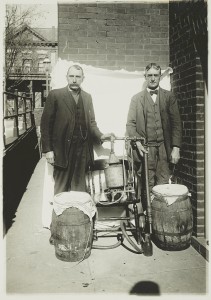 Two men with a whiskey still, sometime between 1920 and 1930. Library of Congress Prints and Photographs Division.
Two men with a whiskey still, sometime between 1920 and 1930. Library of Congress Prints and Photographs Division.
Recently I uncovered some interesting information about my husband’s great-grandfather, Peter Consigli. According to the 6 September 1930 Boston Herald,[1] federal agents from Boston carried out several raids in the town of Milford, Massachusetts, and arrested three men, including Peter, for the manufacture of liquor. According to my husband and father-in-law, no one in their family had ever mentioned this incident.
Wanting to learn more, I searched the Milford Daily News for further details about the arrest. I located a newspaper article titled “Federal Agents Seize Big Still on Purchase Street,”[2] which reported that five federal agents arrived at the Consigli residence on the morning of September 4 and entered a barn located on the property. The agents had been informed that a still was kept there, so they waited in the barn in an attempt to catch someone in the act of operating the still. No one entered the barn, so the agents decided to seize the still and other equipment. The still was “the most unique construction of any ever located throughout the state, according to the police. It was found in a separate compartment in the barn and connected with a chimney in the house, therefore preventing tracing through any odor or smoke. The door of the barn had always remained open, which prevented any suspicion.”[3] In the 5 September 1930 edition of the Milford Daily News, it was reported that Peter and his wife were arraigned on charges of violating the 18th Amendment, which prohibited the production or sale of alcoholic beverages. The charges against Peter’s wife were dismissed, but an article published in the 26 November 1930 edition of the Milford Daily News reported that a federal grand jury in Boston returned 120 indictments, including one against Peter Consigli, for violation of the Prohibition Act.
While looking into this story, I learned that in November 1930, two months after Peter Consigli’s arrest, one of the ballot questions voted on by Massachusetts citizens was whether or not to repeal the Massachusetts Alcohol Prohibition Act, also known as the “Baby Volstead Act.” It was approved, with 649,592 voting in favor of the repeal and 368,544 against it.[4] Shortly after the repeal was approved, however, some Massachusetts law enforcement officials stated that they would continue to arrest individuals transporting liquor. A 2 December 1930 article in the Milford Daily News noted that the repeal pertained to the manufacture and transportation of liquor, but that law enforcement could still charge those who “sell liquor or keep and expose it for sale.”[5]
I am still in the process of searching for additional information about Peter Consigli’s arrest and indictment—and also take a closer look at some of the events and debates that took place in Massachusetts related to the repeal of the Massachusetts Alcohol Prohibition Act. Doing so will add another dimension to the story of Peter’s arrest.
[1] “U.S. Agents Seize Stills at Milford: Make Three Arrests During Their Descent on Town,” Boston Herald, 6 Sept. 1930, p. 24.
[2] “Federal Agents Seize Big Still on Purchase Street,” Milford [Mass.] Daily News, 4 Sept. 1930, p. 1.
[3] “Federal Agents Seize Big Still on Purchase Street,” p. 1.
[4] Statewide Ballot Questions – Statistics by Year: 1919-2012, William F. Galvin, Secretary of the Commonwealth of Massachusetts, at sec.state.ma.us/ele/elebalm/balmresults.html#year1919.
[5] “Will Still Arrest Rum Transporters,” Milford [Mass.] Daily News, 2 Dec. 1930, p. 3.
Share this:

About Eileen Pironti
Eileen writes family histories as part of the Learning & Interpretation team. Under the Newbury Street Press imprint, she has authored several books, including Ancestral Lines of Iain W. F. Shepherd and Helen Waugh (Gray) Shepherd – Journeys in Time. She has written articles for American Ancestors magazine, and contributes to the Vita Brevis blog. Among Eileen’s interests is Irish research. She frequently lectures on this topic for our Education department through online conferences and webinars, and provides consultations to patrons at various research events. Eileen also gives lectures on lesser-utilized resources such as bank records, providing strategies for thinking “outside the box” when conducting research. Eileen’s love of history extends beyond her work as a member of the American Ancestors staff. Since 2015, she and her husband Paul have been live-in caretakers of the William Clapp House in Dorchester, Massachusetts, one of three historic homes owned by the Dorchester Historical Society. In 2019, Eileen wrote “In Her Own Words: The Life of Elizabeth (Clapp) Withington (1816-1845),” an article about a member of the Clapp family, for American Ancestors magazine. Eileen earned a BA in English from Saint Anselm College, and an MS in Justice, Law, and Society from American University.View all posts by Eileen Pironti →